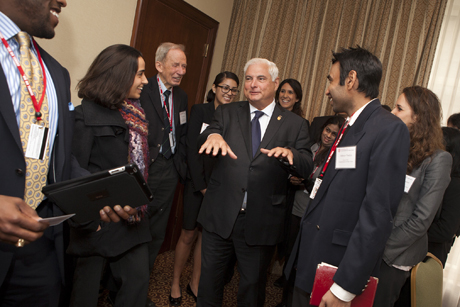Panama president to students: 'Fight another round'
By Susan Kelley

President of the Republic of Panama Ricardo Martinelli experienced a life-changing event while attending military high school in Virginia, he told a Cornell audience April 11.
A burly classmate had invited all comers to go a round with him in the boxing ring. Martinelli took the bait – “a big mistake,” he recalled with a laugh. After being pummeled, he was about to give up. But someone told him to “always fight one more round.”
Martinelli urged the audience to do the same. “That event proved to me that whatever you want in life, you can accomplish. In life, nobody’s perfect, we all make mistakes. ... But you have to fight that one more round.”
He lived that advice when he ran for president in 2004 and came in dead last. He tried again in 2009. That time, he won by a landslide.
Martinelli gave the keynote address of the Cornell Institute for Public Affairs (CIPA) Spring 2013 Colloquium Series. Martinelli also signed an agreement with Cornell that will sponsor Master of Public Administration students (see sidebar).
Part motivational speech, part socioeconomic update, Martinelli’s talk wove personal anecdote with statistics demonstrating the positive changes his administration has effected.
The owner of one of Panama’s largest supermarket chains, Martinelli has focused his administration on fiscal and tax reform and has upended the status quo along the way. He lowered the income tax rate to 15 percent from 27.5 percent; those who make less than $100,000 per year pay no tax. Corporate taxes have dropped to 25 percent from 35 percent. He said Panama has an annual growth rate of about 10 percent for the past three years, and low unemployment.
Martinelli said he has increased Panama’s revenue by granting immigrants residency and work permits after living in the country for only 30 days. Why? “I want them to pay taxes,” he said. His country has invested heavily in infrastructure and has the largest airport and port in Latin America. With an economy based on transportation, Panama has signed free trade agreements with many countries, he said.
Education reform has been Martinelli’s most notable accomplishment, said CIPA graduate student Alvaro Salas-Castro ’14 in opening remarks. Martinelli’s administration reduced the number of high school specializations to seven from 89, which has allowed the students to focus on the basics. The government sponsors 5,000 scholarships for college students to study abroad, and it subsidizes college tuition at home. Students at the University of Panama pay $26.50 per semester, Martinelli said. “I’m very sure that Cornell [tuition] is somewhere close to that,” he quipped.
Martinelli encouraged students in the audience to get involved with politics, a field that needs bright, educated people like them, he said. “The only way that you’re going to change society is from inside [government]. Because people make the mistake of believing that you can make changes in government from the outside,” he said.
He urged them to set their sights high and have the determination to reach those goals. “Things can be done, things can be obtained, if you fight that next round,” he said.
While on campus, Martinelli also discussed Panama’s public policy and development challenges with CIPA faculty and students, visited with MBA students and faculty, and met with Provost Kent Fuchs.
Martinelli’s visit was sponsored by CIPA, the Office of the Vice Provost for International Relations, Mario Einaudi Center for International Studies, Latin American Studies Program and the Samuel Curtis Johnson Graduate School of Management.
Panama, Cornell to collaborate on infrastructure policy
Cornell and the Republic of Panama have agreed to collaborate on education and research in public administration, economic development and infrastructure policy.
“This represents an important milestone in Cornell University’s history,” said Rick Geddes, associate professor of policy analysis and management and director of the Cornell Program in Infrastructure Policy. “We are unaware of any previous examples of Cornell forming a Memorandum of Understanding to further teaching, research and outreach directly with the head of a sovereign state.”
Panama will pay for Panamanian students, who must have at least five years of professional experience, to enroll as CIPA master’s degree candidates. Some of these students will complete coursework in Ithaca for three semesters through CIPA’s new concentration in science, technology and infrastructure policy; they will also affiliate with the Cornell Program in Infrastructure Policy, which launched in fall 2012. “This collaboration will help to promote Cornell’s goal of globalizing its educational efforts,” Geddes said.
Media Contact
Get Cornell news delivered right to your inbox.
Subscribe